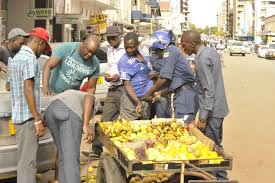
THE scenes unfolding daily in central Harare are disturbing. Vendors, young and old, are chased through the streets by municipal police officers, tripped, shoved and hauled onto open trucks like criminals.
In their desperate bid to flee, some dart into oncoming traffic, risking their lives to protect the little they have, their wares and dignity.
Their crime? Selling at undesignated sites.
This brutality is dehumanising. It exposes the deep moral and policy crisis at the heart of the state. In an economy where millions struggle to survive on less than US$1 a day, street vending has become an act of necessity, not defiance.
It is the last refuge for citizens abandoned by a collapsing job market and an unresponsive state. Some of these vendors are civil servants and other workers trying to hustle outside working hours.
Finance, Economic Development and Investment Promotion minister Mthuli Ncube may boast that Zimbabweans are now “middle-income, spending over US$9 per day”.
But on the streets, the reality tells a different story, one of hunger, desperation and survival against impossible odds.
Instead of persecuting the poor, government must confront the poverty that drives them onto the pavements. Councils may have designated vending sites, but vendors insist these are either too expensive or located in areas with no customers.
- Matabeleland civic groups fume over voter education hurdles
- Matabeleland civic groups fume over voter education hurdles
- Vendors reflect on tough year
- Matabeleland civic groups fume over voter education hurdles
Keep Reading
Many of the spaces have also been captured by space barons who sub-let them for profit, another layer of corruption preying on the vulnerable.
The disconnect is a reflection that there is something wrong somewhere. Ironically, the same government that has failed to create jobs now bans night vending, an activity that has sustained thousands of families.
Local Government minister Daniel Garwe’s pronouncement in August further illustrates the lack of empathy and planning that characterises policymaking today.
The growing defiance among vendors is unsurprising. When survival is criminalised, resistance becomes inevitable. The state cannot continue to impoverish citizens and then punish them for trying to live.
Zimbabwe needs a government that tackles the root causes of poverty, not its symptoms. That means creating jobs, restoring functional social safety nets, recapitalising hospitals, supporting the elderly and disabled and ensuring every child can attend school through an effective Basic Education Assistance Model.
The ongoing crackdowns, amid mounting political and economic tension, risk inflaming an already fragile social situation. Confrontation with vendors threatens not only livelihoods but also national stability.
It is time for dialogue — genuine, inclusive dialogue — between government, councils and vendors’ associations. Sustainable solutions will not come from police batons or truckloads of confiscated tomatoes.
They will come from policy rooted in empathy, planning and respect for the dignity of the people.











